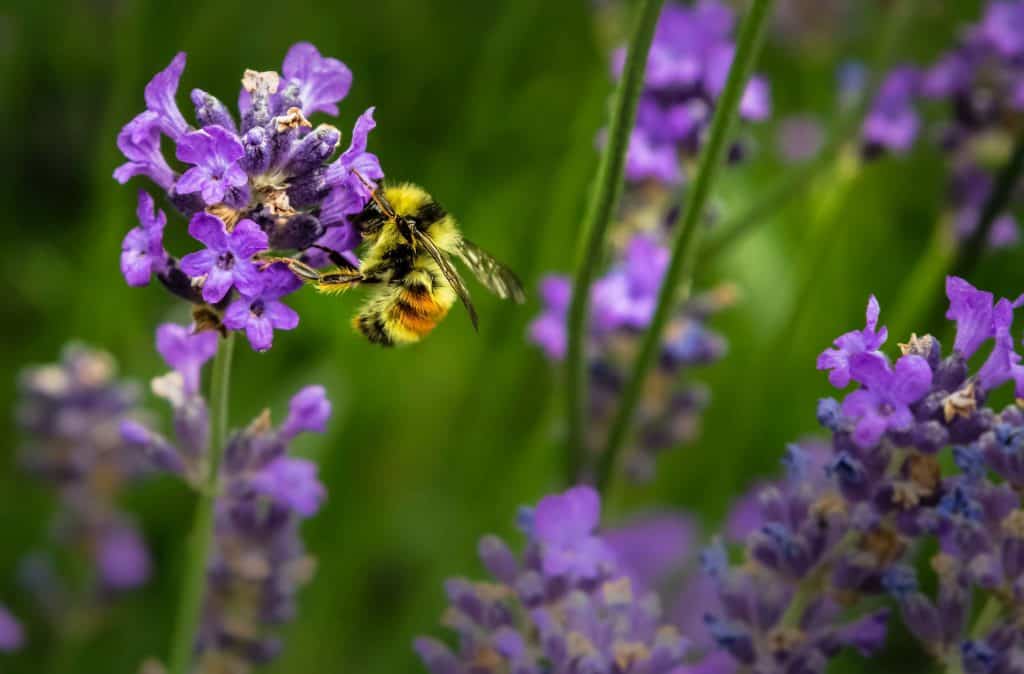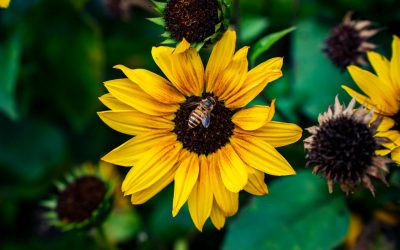5 ways you can help protect our brilliant bees at home
Guest post by Scott Hawthorne
Scott Hawthorne works for waste management company SkipsAndBins.com, which runs a campaign to help raise money for Friends of the Earth‘s Bee Cause. Here, he shares five ways to help endangered bee species.

How can you help our bees and pollinators? Let’s find out with Scott Hawthorne…
If you keep up with the latest news about the environment, then you’ll probably already be well aware that the world’s bee populations are in serious trouble. More than 35 species of bee are currently endangered, and all types are facing critical threats (Friends of the Earth). It’s thought that the decline in bee numbers is caused by deforestation and loss of natural bee habitats, overuse of harmful insecticides, intensive farming, and climate change, among other factors.
#1 Plant an all-seasons garden
Some species of bee are active all year round, and it can sometimes be a struggle for them to find nectar and pollen during the autumn and winter when nothing much is growing.
You can help ensure they have a steady supply of food and pollen by making sure that something is always blooming in your garden throughout the colder months — Gardener’s World has a helpful list of hardy pollinator-friendly plants and flowers that are great for this.
Not only will this help your local bees, but it will help your garden to look bright and beautiful all year round, too.
#2 Let it grow
We humans might like our lawns to be perfectly manicured and free from dandelions and other weeds, but the same can’t be said for bees. Longer lawns provide a vital place for bees to feed and shelter: they especially love the little wildflowers and weeds that pop up in longer grasses.
So, if you have a lawn in your garden, consider letting a section of it grow out to make a mini meadow for bees and other pollinators to enjoy.
For an eye-catching lawn that’s also bee-friendly, you could consider mowing your lawn in a swirling pattern, creating a contrasting texture.
#3 Find natural alternatives to pesticides
Unfortunately, chemical insecticides are designed to kill all insects indiscriminately. So, even if you aren’t using them with the intention of harming bees, that’s exactly what they’ll do.
A type of pesticide called neonicotinoids is particularly harmful to bees, because it can linger in the plant for a very long time after just one application. If you want to help bees in your garden to thrive, avoid using chemical insecticide products completely.
There are plenty of natural, bee-friendly methods of pest control that you can use instead.
For instance, natural sprays made using garlic or other scents can help deter pests from ruining your crops or plants, without harming bees. You can also try using bee-friendly physical deterrents, such as copper tape or sharp gravel, to help prevent hungry slugs and snails from feasting on your blooms.
#4 Go organic
Intensive farming and heavy pesticide use in agriculture are a major cause of declining insect rates around the world. Of course, you can’t do much to change farming practices all on your own — but you do have control over your shopping habits.
Buying organic food, clothing, and products whenever you can is better for the environment and safer for bees. This is because organic farming methods use land less intensively, and avoid using artificial fertilizers and harmful pesticides, all of which are better for our pollinator friends.
So, look for organic produce when shopping at the supermarket, or when buying clothing made materials like cotton or linen. If you eat honey, be sure to source it from organic and sustainable local beekeepers, as this will support them in keeping colonies going, too.
#5 Give tired bees a boost
Have you ever come across a bee lying on the ground in your garden, and wondered how to help them?
Tired, hungry bees often just need a rest and a snack so, if you see one in trouble on the ground, don’t move them. Instead, mix a couple of spoonfuls of white, granulated sugar with a spoonful of water, and place it on the ground near the bee for them to enjoy, but never give them honey.
Once they’ve had a rest and something to eat and drink, they will often have the energy to fly on their way.
Right now, bees need us almost as much as we need them. So, if you want to make a difference, try any of the bee-friendly suggestions I’ve shared here.
About the author:
Scott Hawthorne works for waste management company SkipsAndBins.com, which runs a campaign to help raise money for Friends of the Earth’s Bee Cause.



